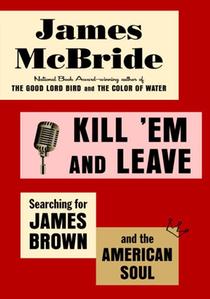
|
|
| photo: Chia Messina | |
James McBride has written memoir (the acclaimed The Color of Water), fiction (most recently, The Good Lord Bird, a National Book Award winner), screenplays (Red Hook Summer, with Spike Lee), and documentaries (The Process), along with journalism. He's a musician, a father and a biographer. His latest book, Kill 'Em and Leave: Searching for the Real James Brown (Spiegel & Grau), is less a biography than a meditation on the intersection of his own life, the cultural and racial significance of superstar James Brown, and the American character as shaped by popular music and culture. See our review below.
You grew up next to James Brown, right?
My family moved to Queens when I was about eight, maybe. So I used to see his house all the time. He was a long way from my house, but I had a friend who lived right down the street. Sometimes groups of us would cross the railroad tracks, which was a dangerous piece of business, but you'd go to see James Brown's house and maybe he would come out.
You've got that story in there about your sister.
Yeah, my sister. My sister, Dotty, yeah. That was a great story.
Her stock went up after [she saw James Brown] quite a bit. I mean he was really admired when I was a boy. He was almost a civil rights figure. He epitomized so much about our community that seemed so special because he was always about pride and hard work. He just represented so much that was positive. He was someone that you wanted to emulate because he just had this great talent, but he also had this great philosophy, which was even one of his songs--"I Don't Want Nobody to Give Me Nothing (Open Up the Door, I'll Get It Myself)." So that whole business of work and work ethic, and moral soundness, and all those things--they really represented that for a lot of people in my era.
What did James Brown represent?
He represented the pride and pain of the African American community at a time when it was voiceless. But it resonated with a lot of people because they understand what that's like to be arrested, or to be accused of something, or to fall short. Forgiveness is a big part of the Christian experience in the black community; in any community, really. In New York--I'm speaking to you from the basement of the church because I run this program--there are lots of people coming to this church (and other churches) that have all kinds of really complicated, horrible problems. But the church is a place for forgiveness and so is the community that [Brown] represented. It was, and to some degree still is, a community that understands that no one's perfect and there is some pain in life for everyone, including the stars among us, meaning James Brown.
His life was really a metaphor for African American life in general, I think.
 That's how this book reads to me. It's not a James Brown thing. It's a race thing.
That's how this book reads to me. It's not a James Brown thing. It's a race thing.
It's sad that it's a race thing because ultimately the people who are suffering now as a result of this race problem are the poor children in South Carolina and Georgia because of his estate and the way his estate is being manhandled. [Editor's note: factions of Brown's family have contested his desire to give away most of his estate to underprivileged youth; the money has now dwindled to a fraction of its former amount, with most of it going to lawyers and none of it to poor kids.] But more than that, he really did have a sensitivity for African American life and for poor people. That's unusual. I mean he had a real feeling for them as opposed to just some of this cursory What are we going to do about the poor? And he'd do a concert to raise money for someone or something like that. He was really committed to the idea of equality for all people.
I agree. Why do you think that is?
I think in part because of his background. And in part because of his understanding that the community he came from produced a tremendous amount from which he got very little remuneration. As an artist, he experienced the change that happened in the music business, as his music was used to power other careers. It's an old story, and it's a sad story. There seems to be no end to it. I'm used to seeing and hearing about jazz musicians who died in relative obscurity and poverty and so forth, but I never thought that the beast of the American intellectual show business machine would swallow someone like James Brown whole. I never thought that could happen. But, indeed, it has.
I think our culture just eats up whatever it can. Whatever it can digest, and it can digest an awful lot.
What do we do with the innovators in our society who create these great cultural movements? It seems we absorb them and then we just spit out the shell and we go onto the next one, a new artist, with industrial strength efficiency. Churning it out into a sort of a cheap spread for your toast and on we go. That's dangerous because a lot of what you leave behind when you leave your music through a legacy, when you leave the lines of it in the gutter, you leave a lot of stuff behind. That's part of the reason I wrote the book--because James Brown was bigger than music. He was about American culture and what American culture represented, inclusive of African American life.
I'm so tired of talking about race. I really would like to change the subject.
How do you change the conversation? What's the conversation you would have if you ran the world?
I'm talking to you from the basement of my church in Brooklyn. Every Thursday and every Saturday, I'm here teaching kids music. Music teaches you how to think. It teaches you how to process thoughts. It teaches you how to fail. It teaches you cumulative learning. It teaches you team work. So, I only want to talk solution. I no longer burn up a whole lot of ink talking about the problems because we all know what the problems are. I think individually, each of us needs to do something to collectively move America forward in a positive way. To his credit, despite the horrible things that he did in his life and some of the horrible things that happened to him in his life, one of the things that I really found most impressive about James Brown was at the end of his life, he knew he had done wrong, and he really tried to correct in a big way. How many of us can say that?
James Brown is one of the great cultural innovators of our time. He really, really created entire categories of music that we divvy up now and call it this and we call it that. We label it funk. We label it easy listening. We label it smooth jazz. James Brown had an enormous effect, he cut trails for a lot of that stuff (and his band as well). They got very little credit for that.
You talk a little bit about solutions. What are your solutions?
Well, look. Musicians understand what James Brown was. You don't have to explain to a musician who James Brown was and what the importance of African American music and its development--you just don't. My 14-year-old son takes organ from a Jewish guy who plays the hell out of the organ, man. He's a great player.
He's just a bad cat, and he understands the history, so he's telling my son the history of the instrument. And I don't care--if my house is on fire, my children are in it, and I don't care who brings me water. I'm going to say that. That's really what we have to do with our children. We have to teach them that this music is about our collective history. If they don't know their music, if they don't understand the collective history of American music, then they're missing out on being whole. There's no difference in my opinion from a gutter in Vienna in 1790 and a gutter in West Virginia and a gutter in Harlem. There's no difference. The music comes from the same place. It's about showing respect for the history of the music because the history of the music is what binds us. I think that's really James Brown's greatest legacy if you have to put it in a nutshell. He tries to bind us together in his own awkward, horribly crippled fashion. He tried to bind us together, and our collective response has not been good. --Rob LeFebvre, freelance writer and editor

